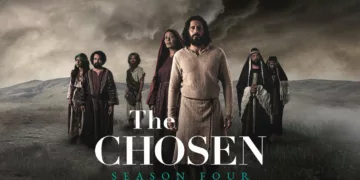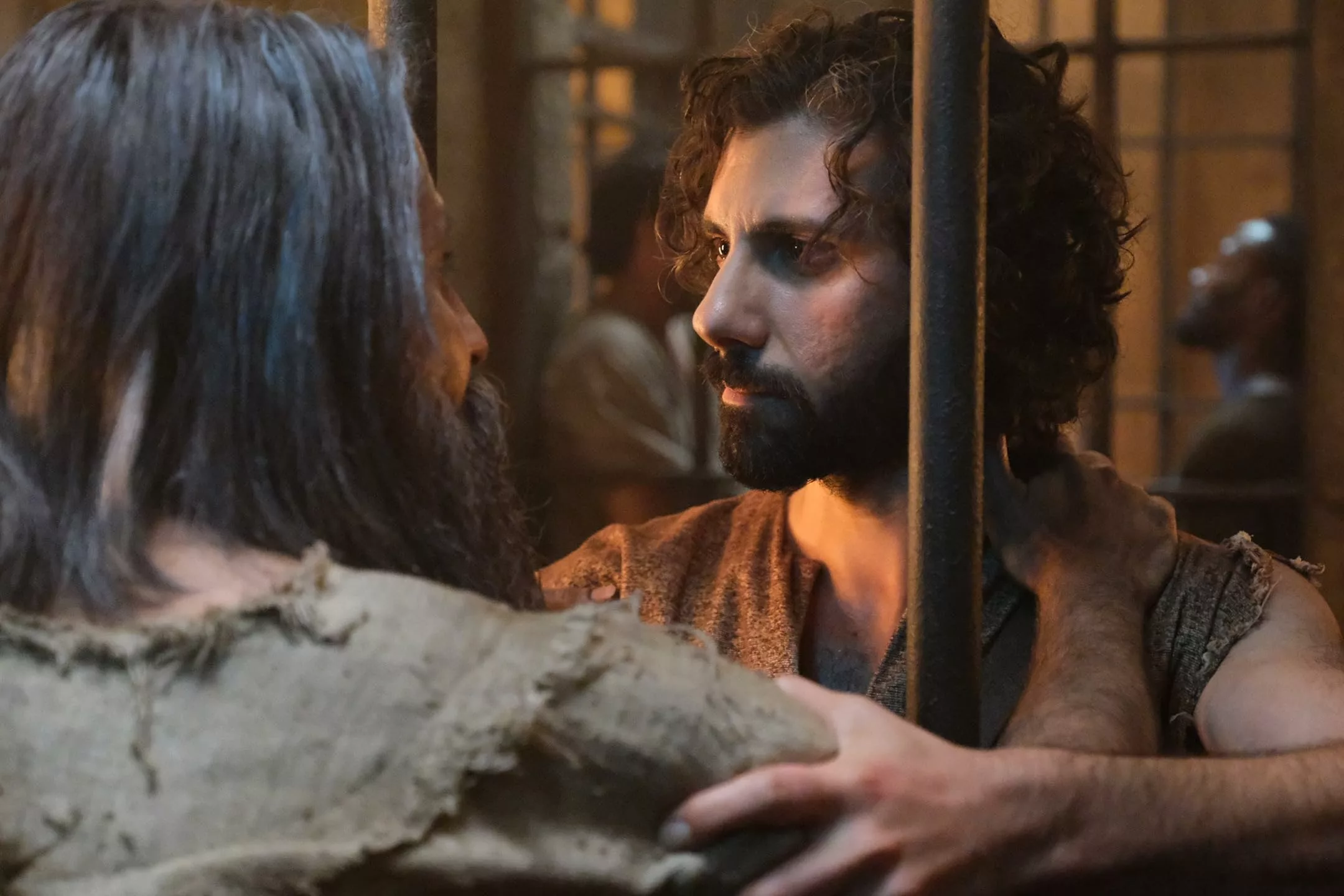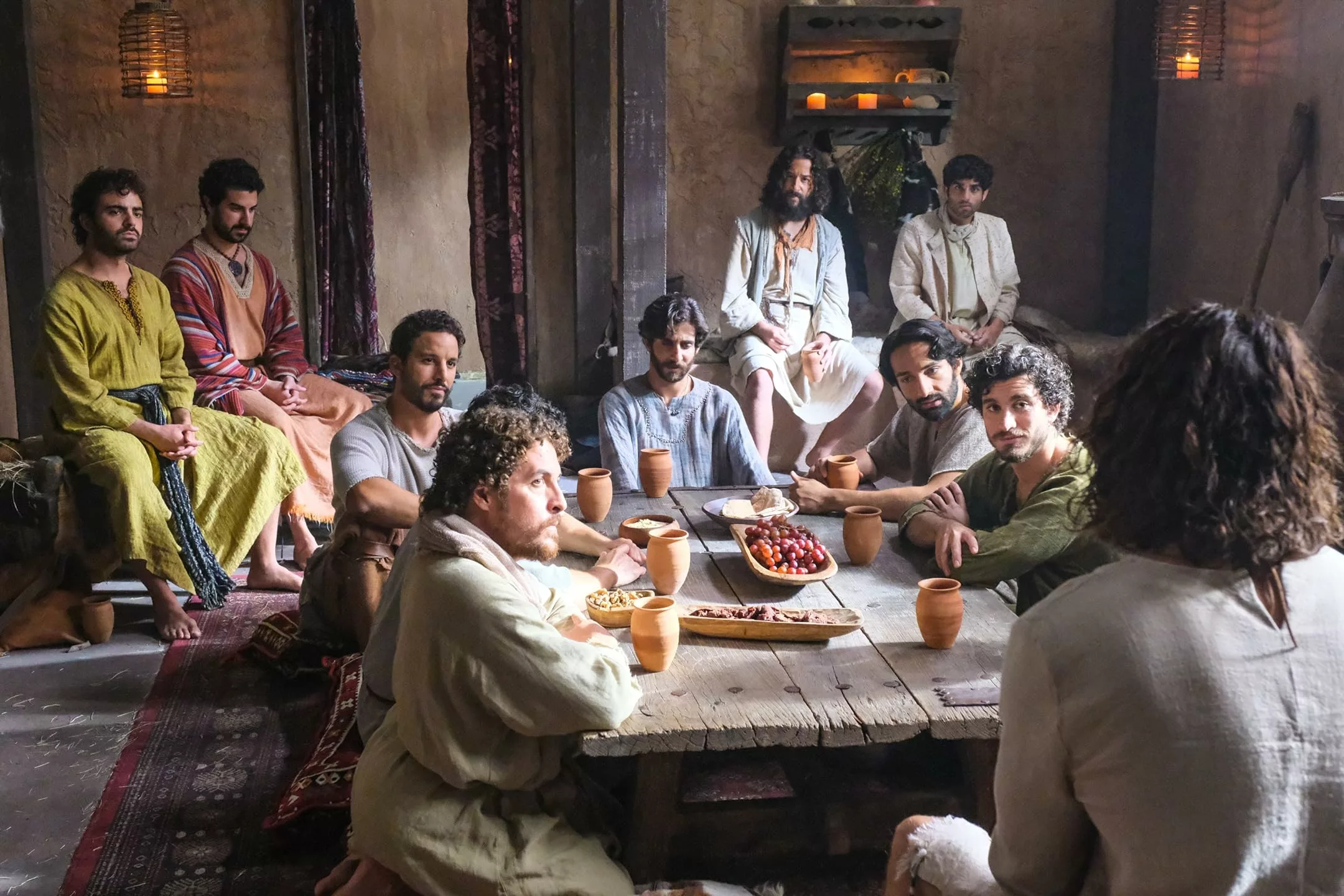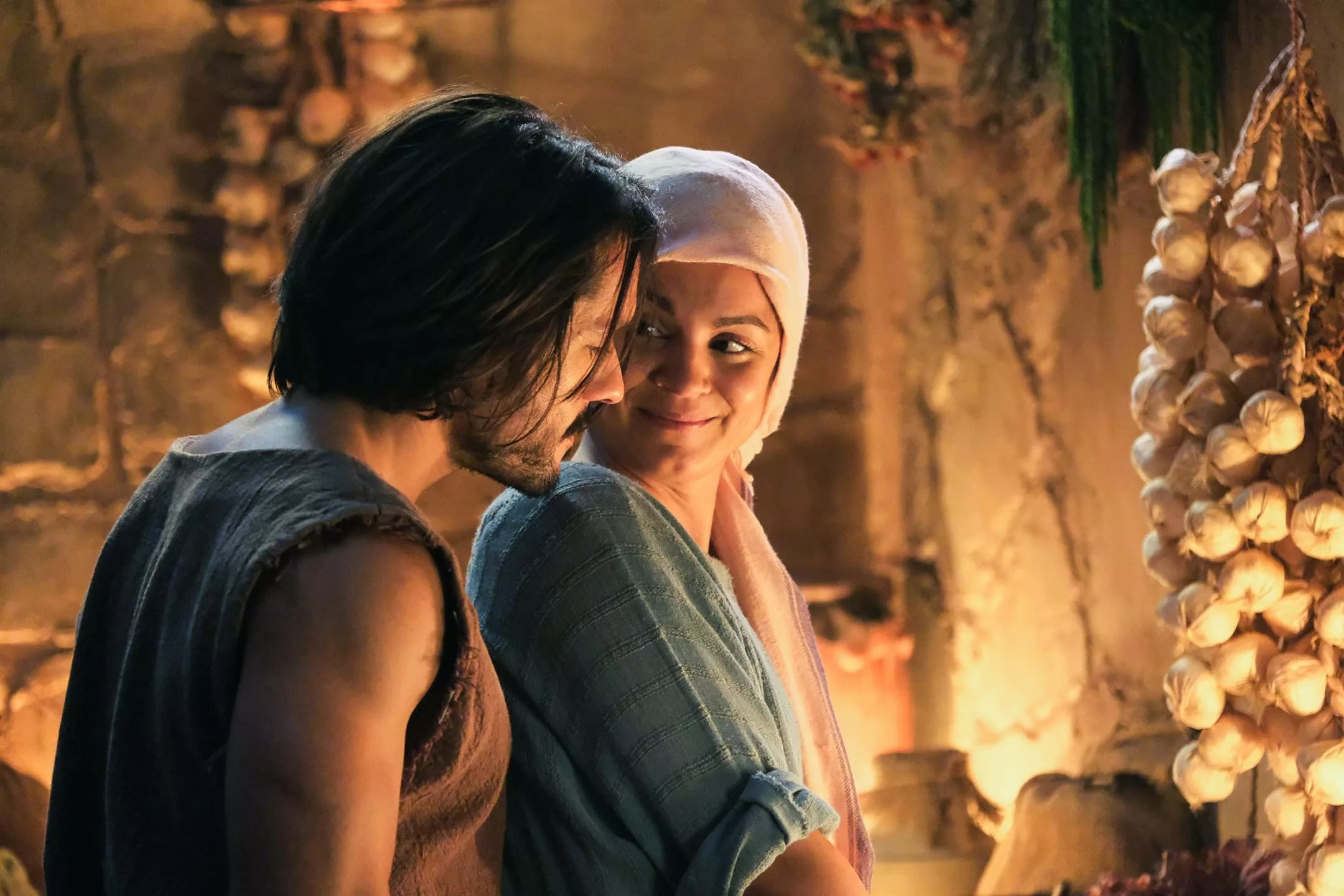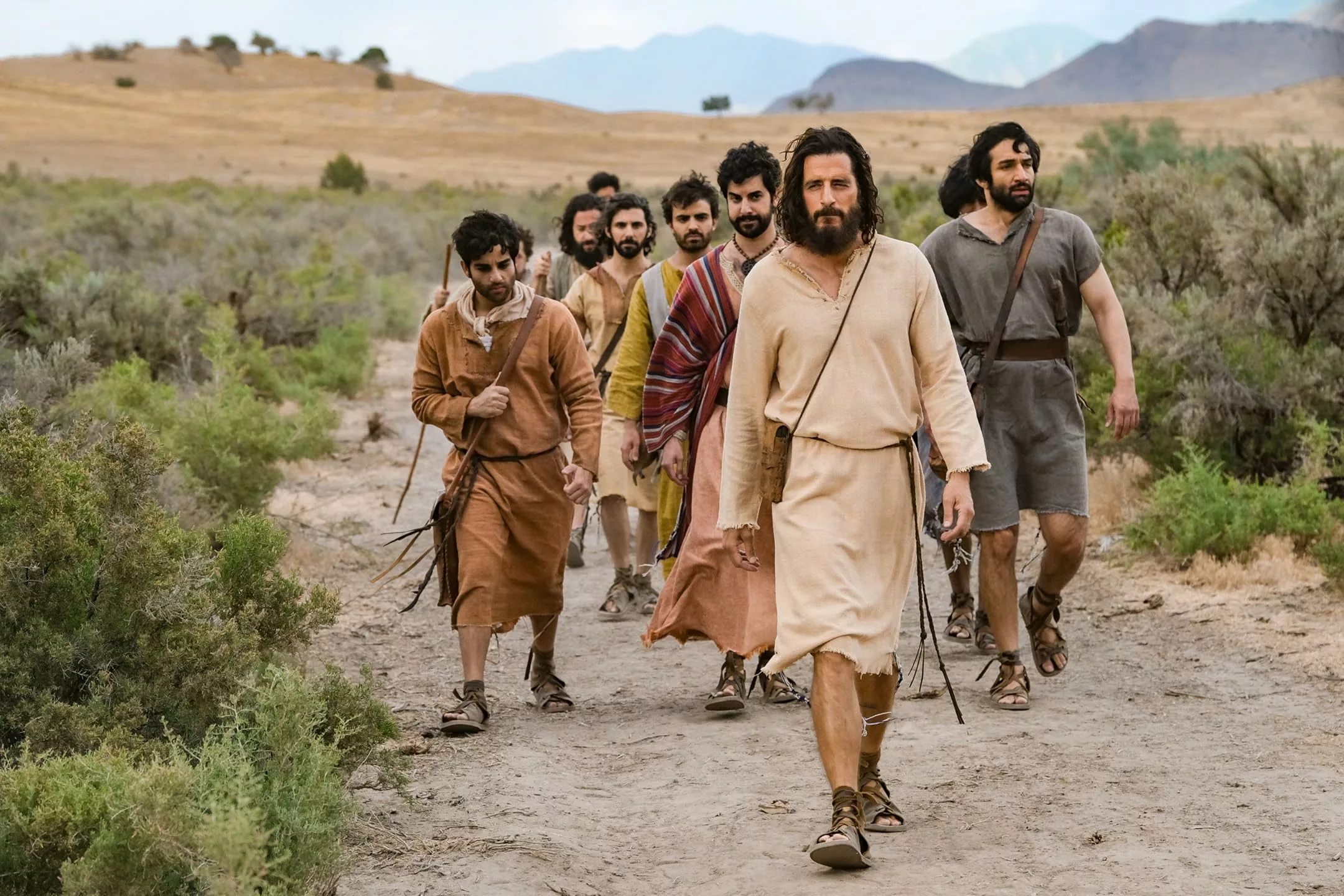As Jesus and his followers carried on their ministry across the Holy Land, their challenges grew in season four of The Chosen. By now, word had spread of this curious rabbi who performed healings and spoke with mysterious authority. Crowds flocked to hear his parables and see displays of his power.
Yet Jesus also faced rising opposition from the established religious authorities, who saw him as a threat. Meanwhile, the Roman Empire watched closely as tensions simmered between their occupying forces and the restive populace. All the players knew change was coming, though the form it would take remained uncertain.
This season finds Jesus deploying his talents in new regions, and the devoted apostles are learning through both triumph and turmoil. But darker storms soon descend. The maniac king Herod, disquieted by the prospect of a rival, locks the fiery prophet John in the dungeon. And in Jerusalem, suspicion and fear of disruption strengthen the resolve of those who’d suppress movements not their own.
As Jesus guides his followers toward their fateful gathering in the holy city, personal challenges also arise within their fellowship. Loyalties are tested, both with each other and with their leader. By the season’s end, the first dramatic steps will be taken towards the crisis that shapes our faith. Yet even in the shadow of Golgotha, glimpses remain of divine compassion and the hope that transcends earthly powers.
Traveling Back in Time
The season premiere transports us back four years before the start of Jesus’ ministry. Mary visits her cousin Elizabeth, and we feel the joy and wonder they share in their miraculous pregnancies. This sets the stage for what’s to come.
We find Jesus in Bethany, grieving the death of his dear friend Lazarus. In a powerful scene, he calls Lazarus from the tomb, defeating death itself. Jesus weeps with Mary and Martha, sharing in their sorrow. This pivotal moment underscores his power over life and death.
A long-simmering feud between Simon Peter and Matthew reaches its boiling point. Jesus intervenes, calling them to forgiveness. In a heartfelt moment, they embrace each other each other as brothers. Freed from past wrongs and divisions, both disciples seem to find a new purpose in Christ’s ministry. Their reconciliation rings with hope that all people united in love can overcome even long histories of conflict.
These standout episodes highlight key themes. The premiere skillfully provides context through flashbacks. Raising Lazarus presents a defining miracle with emotion and grace. Reconciliation powerfully shows Jesus mending broken relationships and renewing purpose. At their best, these episodes bring the Bible to life through strong storytelling that’s both absorbing and thought-provoking. Of course, not every moment is perfect. Some subplots feel like distractions, and not all character changes are smoothly executed. Yet overall, The Chosen continues to share timeless lessons in a fresh, visual way that draws us deeper into Jesus’ world.
Season 4 Continues to Develop Rich Characters
The characters of The Chosen continue to grow into some of the most fully realized figures in any biblical drama. Jesus remains the calming center, with equal parts wisdom and empathy. though hints of his looming sacrifice weigh heavier. Jonathan Roumie brings a layered sense of purpose to the role without losing warmth.
Many disciples face challenges this season. Simon Peter grapples with his new name and role, growing humbler. Thomas hopes to marry, but doubts linger. Judas’ unease intensifies as practical matters collide with faith. These interior journeys feel genuine, not merely plot devices.
Character depth extends beyond the twelve. Mary Magdalene has a mystical edge this year, intuitive to Jesus’ mindset. As tensions rise, she, like the others, must navigate personal and political turmoil. Elders Caiaphas and Annas take on greater intrigue as adversaries to the coming kingdom.
One change is that Phillip is now played by Reza Diako after Yoshi Barrigas’ departure. Diako doesn’t instantly capture what made Barrigas’ take compelling, but smartly, the series acknowledges the recast upfront. It allows getting accustomed to Diako’s take without disruption.
Herod and his circle depict the temporal power antagonizing the spiritual, yet as people rather than mustache-twirling villains. Paul Ben-Victor instills the Tetrarch with irrational insecurity behind bluster. Shereen Khan is hauntingly self-possessed, as is his calculating wife.
Across varied roles, both major and minor, performances remain a Chosen strength. Fleshed-out characters immerse us in the world rather than simply drive the plot. Their interactions and internal journeys bring the story to life in a way any adaptation strives for.
The Messiah Among Us
Jesus walks the dusty streets just like any man of his time. Yet something is different—a light shines within him that cannot be denied. Wherever he goes, lives are changed and hearts are opened, though not without resistance from those set in their ways.
In this television telling of the gospel accounts, Jesus and his followers come to life as real people living through turbulent events. We see their hopes, struggles, and relationships illuminated with care, respect, and emotional intelligence. History mixes seamlessly with character-driven drama as familiar Bible passages are seasoned with inventive new dialogue and context.
Central themes like forgiveness, sacrifice, and servant leadership are woven subtly into everyday challenges—a tax collector’s anguish, sibling rivalry between the Sons of Thunder, or a troubled woman’s secret pains. Through it all, Jesus models a higher way of resolving conflicts and meeting human needs. His teachings cut through superficial rituals to uncover eternal spiritual truths applicable anywhere.
Bold creative choices also stir discussion. An unexpected plot twist early on challenges orthodox views, as do occasional diversions into the private lives of disciples not fully detailed in scripture. Yet by humanizing holy figures as messy, growing beings, the show cultivates empathy and shared wisdom across divides. If any license strays too far, authentic moments far outweigh these, keeping Jesus’ example of radical love and justice central to ongoing conversations.
Overall, by transposing ancient texts into a visually rich present, this serial brings the Bible’s timeless message of hope, healing, and social change into clear focus for our world today.
The Chosen Grows Into Its Ambitions
The Chosen has come a long way from its earlier seasons. What began as a modestly produced story of Jesus and his followers has expanded its horizons season by season. Now in its fourth outing, the show’s aspirations and budget are more aligned – to the great benefit of viewers.
Visually, Season 4 is a revelation. Designers have pulled out all the stops in recreating 1st century Israel. From the bustling streets of Jerusalem to intimate scenes around Jesus’ campfire, the settings feel lived in and period-appropriate. Costumes are a highlight, dressing characters in graceful ropes and sandals that transport the eyes. Production has also taken advantage of new locations, lending energy to its wider scope. All the added detail draws us deeper into the world.
Cinematography matches this heightened standard. Cameras frame shots with an artist’s eye, balancing intimate character moments with vistas that breathe life into the landscape. Mood and meaning emerge through subtle stylistic choices. One breathes easier in the scenes outside the city, feeling the freedom and uncertainty the characters experienced.
While special effects are kept to a minimum for the most part, respecting the story’s grounded nature, Jesus’ miracles still dazzle. The raising of Lazarus avoids gimmicks for a stark, emotional reveal between friends. Sometimes less is more when wielding the powers of scripture.
Any technical flaws are minor, compared to the leaps made in mounting this biblical epic justly. Through its advances in production, The Chosen’s fourth season proves worthy of its subjects and their timeless relevance. Fans old and new will find much to appreciate in its blooming ambition to share their story with the world.
Cinematic Storytelling in The Chosen: Season 4
Season 4 of The Chosen raises the stakes in showcasing Jesus’ ministry. While artistic liberties have been taken, the heart remains true to its purpose – bringing Christ’s message to life.
This season delves deeper into political intrigue, with tensions growing between Jewish leaders, occupying Romans, and Jesus’ burgeoning movement. Historically, religious persecution often stems from threatened power structures. The show captures this reality with relatable characters on all sides, helping us understand conflicts even when disagreeing.
By focusing on personal journeys, The Chosen has always drawn viewers in. This year, disciples like Peter and Thomas face more complex challenges, reflecting how faith evolves through life’s ups and downs. Their honesty highlights Christ’s consistent compassion—a message especially needed today.
Production values have strengthened immensely. Care put into elaborate sets, costumes, and cinematography transports us to first-century Judea. Major biblical moments, like the raising of Lazarus, are staged to feel real, surprising, and moving.
While some question narrative choices, overall, The Chosen succeeds by prioritizing relationships. From Mary Magdalene’s powerful redemption to debates that feel ripped from our own times, it presents Jesus as a radical voice calling all people to love and understand one another.
Three full seasons in, few works have brought Scripture to such vibrant cinematic life while inspiring millions worldwide. As Jesus’ time grows short, The Chosen’s impact will surely endure by keeping faith and humanity firmly in focus.
Understanding the Story of Christ
Season 4 of The Chosen takes viewers even deeper into the heart of Jesus’ ministry. With each episode, the portrait of Christ grows ever more vivid through his compassion for all people and brave confrontation of injustice. Meanwhile, the disciples continue to develop in complex, relatable ways on their journey towards fully understanding and spreading Jesus’ radical message of love.
For anyone wishing to further their knowledge of Christianity’s foundations or simply find a top-notch story, this show delivers. Rich productions and committed performances breathe new life into well-known gospel tales. Familiar figures become multidimensional, while unfamiliar sides of the apostles’ development enthrall. Yet for all the drama, Christ’s example of mercy and challenge to the status quo resonate all the more today.
Of course, as with any faithful adaptation, liberties are taken. But for most, creative flourishes only enhance appreciation of the biblical heart. And with high praise from believers and non-believers alike, perhaps The Chosen helps bridge divides by bringing people of all backgrounds to Jesus in their own way. As the end inches ever closer, excitement grows for what’s yet to unfold before the climax arrives. For now, seasons 1 through 4 make for an epic that, like Christ’s own message, brings light to all who open themselves to its lessons of hope.
The Review
The Chosen Season 4
While not a flawless adaptation, The Chosen succeeds marvelously in its goal of introducing viewers to Jesus and his followers as fully dimensional, profoundly relatable people. Rich productions, strong acting, and careful attention to theological and historical nuance give deep insight into Christianity's foundations that can resonate across beliefs. Season 4 in particular advances the compelling narrative at a captivating clip while grappling with heavy subject matter in a thoughtful, moving way. For those open to exploring faith or simply finding an epic drama, this series delivers an engrossing watch.
PROS
- A deeply moving and authentic portrayal of Jesus and the disciples
- High production values, detailed sets, and costumes
- Thoughtfully handles theological messages and history
- Advances complex narratives in a captivating way.
- Strong acting and character development
CONS
- Occasional overly dramatic creative liberties and embellishments
- Some dialogue and quotations feel stiff or outdated.
- Significant changes like recasting disciples can take adjusting to
